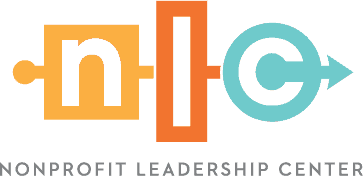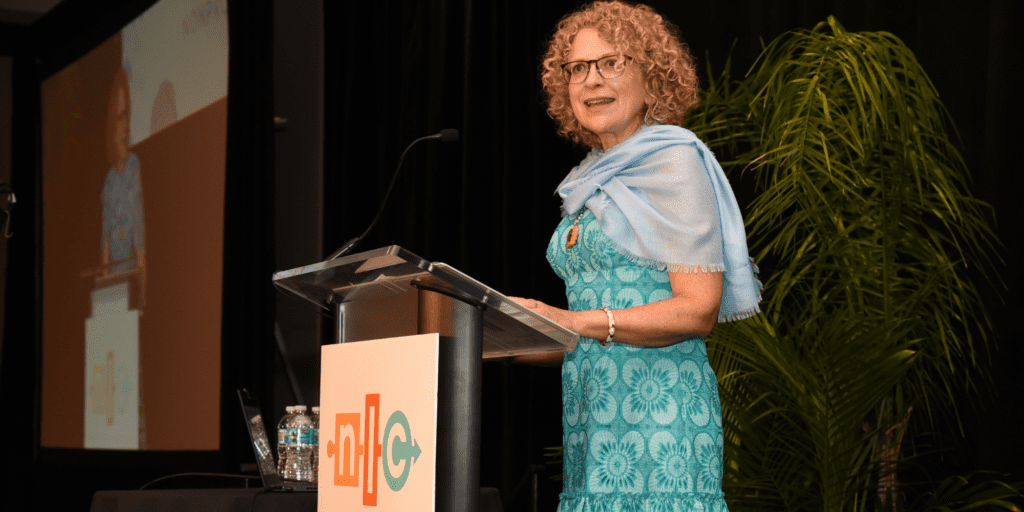As a nonprofit that exists to support other nonprofits, the Nonprofit Leadership Center believes that the best lessons come from nonprofit leaders themselves. Developing and connecting nonprofit leaders to strengthen organizations and our community starts with celebrating and elevating others who are doing exceptional work to improve lives, change outcomes and enhance our world.
We’re thrilled to launch our new 10 Questions With Series that profiles nonprofit and business leaders who are making an enduring impact on our communities. We thought it was only fitting to start with our own CEO Emily H. Benham before asking others to sit in the hot seat.
Emily has led the Nonprofit Leadership Center as CEO for the past nearly nine years. Prior to joining Team NLC, she spent more than 15 years at the Bayfront Health Foundation in development. She lives by the mantra “cultivate an attitude of gratitude — every day in all that you do.” When Emily is not at work, you can find her in the barn with her horse Current Affair.
10 Questions With Emily Benham
Q1. When you were a child, what did you want to be when you grew up?
Emily: I wanted to be a doctor. I love science. I was going to go to medical school. In college, I was pre-med and a music major. My experiments blew up one time too many, and I retreated to the music building where I stayed.
Q2. What drew you to your current role as CEO of the Nonprofit Leadership Center?
Emily: My love of learning. I had an opportunity to make a career transition, and I stepped back and asked myself what I’ve always loved to do. I loved to learn. This was the perfect home for me. At NLC, we offer a variety of lifelong learning opportunities that develop and connect nonprofit leaders to strengthen organizations and communities.
Q3. What do you think is the most important factor to attract today’s donors in an ever-changing world?
Emily: More than anything, it’s an authentic connection. People are looking for that connection to a person, a cause and an institution. That comes with developing relationships over a period of time and stepping away from the transactional nature of fundraising to really focus on transformational relationships. It’s about knowing what your institution needs, knowing what your donor loves and putting those two things together.
Q4. Why do you think so many nonprofits struggle to get out of the transactional mode?
Emily: I think it’s a combination of things. It’s the everyday pressures of having payroll to meet, a budget to meet and getting money in the door today. Organizations aren’t necessarily taking the long-term view on needing to build a relationship with a donor to understand them and why they care or don’t care about their organization before actually making an ask. Our timeline is not necessarily our donor’s timeline, and I think we forget that.
Q5. What is the most important piece of advice you’d give to new professionals or emerging leaders?
Emily: Lift your heads up from your personal dashboards. They’re very important and serve as guideposts, but lift your heads up from that and listen, watch and connect to those around you. You’re going to learn the most from watching and connecting to others.
Additionally, I always coach emerging leaders to put yourself in the other person’s shoes. I once worked at an organization that received the largest gift in the institution’s history. We were obviously thrilled. This was going to have a huge impact on the organization and those we served. However, the top priority for one of my colleagues was whether or not he was going to have to change his business card. Although I was frustrated by his response, I realized that from his perspective, the gift was not going to make his job any easier and only meant that the name of his department was going to change. Putting myself in my colleague’s shoes allowed me to better understand his perspective and how to best respond.
Q6. As the CEO of NLC, we all know you’re a self-proclaimed lifelong learner. Although you’re a seasoned leader, what do you still want to learn more about?
Emily: Personally, I want to learn how to play the guitar. I want to learn how to decorate a cake, because I love baking. My other love is riding horses, and I have a now 17-year-old retired thoroughbred who I am always learning to do more with.
Professionally, I’d like to learn more about coaching. I’m exploring becoming certified in coaching because I see a lot of need in the field and I always want to be sure, while we do it informally every day, that I know everything I need to know to be able to help people excel. Additionally, I always think I can learn more about accounting, so I’m going to take some more accounting courses here at NLC.
Q7: What’s the best book you’ve read that every nonprofit leader should read?
Emily: I think Delivering Happiness by Tony Hsieh. Tony Hsieh is the CEO of Zappos. He’s an amazing leader who created a culture in his workplace of happiness. That comes out through every person you talk to on the phone of delighting the customer. We’ve modeled a lot of our practices here at NLC on him and his company, and I think that’s the way that businesses and nonprofits can really distinguish themselves.
Q8: What’s something interesting that most people wouldn’t know about you?
Emily: I play the cello and met my husband in our college orchestra.
Q9: Being a music major and meeting your husband in your college orchestra, you’re clearly a music buff. What’s on your current playlist?
Emily: Well, I just bought a pick-up truck and have a six-month subscription to satellite radio. I’m loving the symphony channel. Listening to classical symphony music brings me delight and happiness every time I drive my truck.
Q10: What food could you not live without?
Emily: Coffee. Is coffee a food? If coffee’s a food, then it’s coffee.
Would you or someone you know be a great leader to profile for an upcoming 10 Questions With Series article? Email us at info@nlctb.org with your recommendations.

